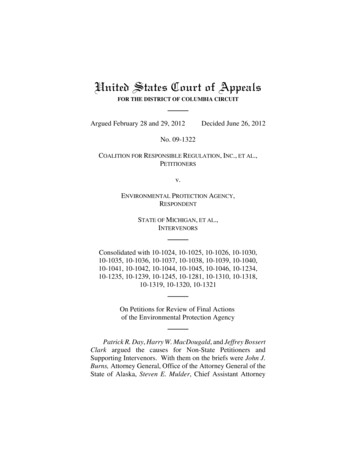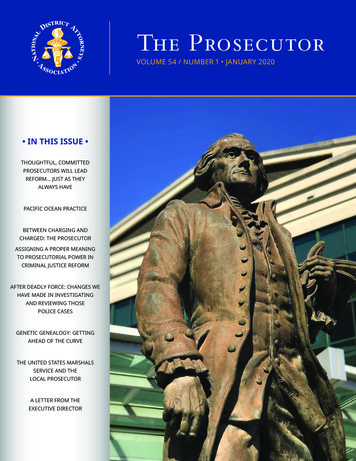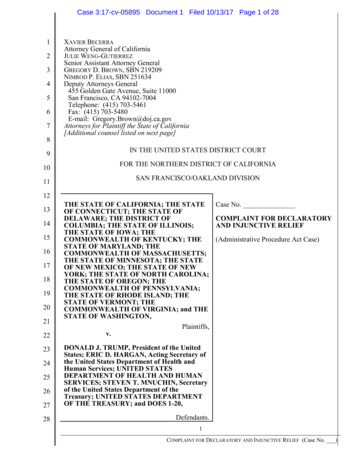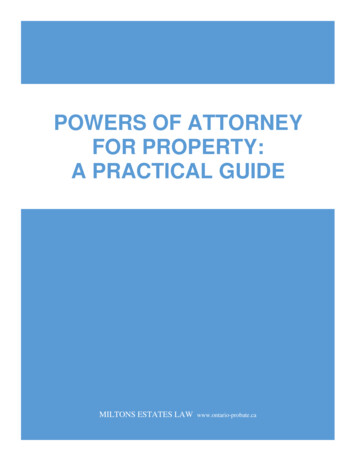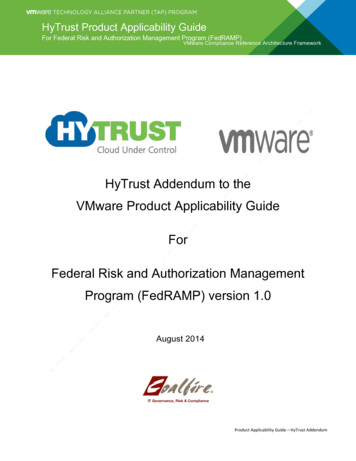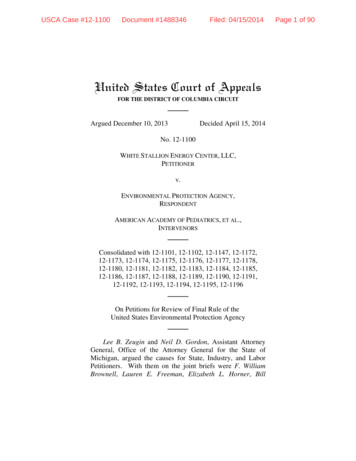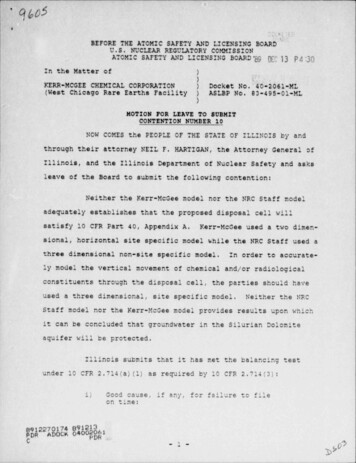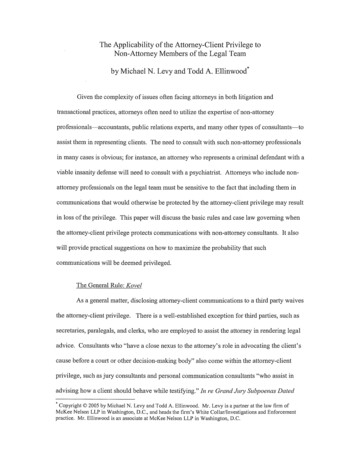
Transcription
The Applicability of the Attorney-Client Privilege toNon-Attorney Members of the Legal Teamby Michael N. Levy and Todd A. Ellinwood*Given the complexity of issues often facing attorneys in both litigation andtransactional practices, attorneys often need to utilize the expertise of non-attorneyprofessionals-accountants, public relations experts, and many other types of consultants-toassist them in representing clients. The need to consult with such non-attorney professionalsin many cases is obvious; for instance, an attorney who represents a criminal defendant with aviable insanity defense will need to consult with a psychiatrist. Attorneys who include nonattorney professionals on the legal team must be sensitive to the fact that including them incommunications that would otherwise be protected by the attorney-client privilege may resultin loss of the privilege. This paper will discuss the basic rules and case law governing whenthe attorney-client privilege protects communications with non-attorney consultants. It alsowill provide practical suggestions on how to maximize the probability that suchcommunications will be deemed privileged.The General Rule: Kave!As a general matter, disclosing attorney-client communications to a third party waivesthe attorney-client privilege. There is a well-established exception for third parties, such assecretaries, paralegals, and clerks, who are employed to assist the attorney in rendering legaladvice. Consultants who "have a close nexus to the attorney's role in advocating the client'scause before a court or other decision-making body" also come within the attorney-clientp1ivilege, such as jury consultants and personal c01mnunication consultants "who assist inadvising how a client should behave while testifying." In re Grand Jury Subpoenas Dated Copyright 2005 by Michael N. Levy and Todd A. Ellinwood. Mr. Levy is a partner at the law firm ofMcKee Nelson LLP in Washington, D.C., and heads the firm's White Collar/Investigations and Enforcementpractice. Mr. Ellinwood is an associate at McKee Nelson LLP in Washington, D.C.
Mar. 24, 2003, 265 F. Supp.2d 321, 330-31 (S.D.N.Y. 2003); see also United States v.Alvarez, 519 F.2d 1036 (3d Cir. 1975) (recognizing attorney-client privilege between acriminal defendant and psychiatrist hired by defense counsel in preparation for trial).This principle has been applied more broadly as well, beginning with the seminal caseof United States v. Kave!, 296 F.2d 918 (2d Cir. 1961). In Kave!, the law furn employed anaccountant, who was held in criminal contempt for refusing to testify about his conversationswith the law firm's client. On appeal, Judge Friendly assessed whether the attorney-clientprivilege protects communications between the law firn1's client and the accountant.Recognizing that there are situations "where the lawyer needs outside help," the court foundthat when the accountant assists in the "effective consultation between the client and thelawyer which the privilege is designed to permit," the privilege should protect thecommunications. Id. at 922.The Kave! court analogized the use of an accountant to the use of a foreign languagetranslator because "[ a]ccounting concepts are a foreign language to some lawyers in almostall cases, and to almost all lawyers in some cases." Id. If the attorney directs the client tocommunicate with the accountant, "who is then to interpret it so that the lawyer may bettergive legal advice, communications by the client reasonably related to that purpose ought fallwithin the privilege." Id. In an often-cited passage, the Kovel court stated: "What is vital tothe privilege is that the c01mnunication be made in c01?fidence for the purpose of obtaininglegal advice f,-om the lawyer. If what is sought is not legal advice but only accountingservice, . or if the advice sought is the accountant's rather than the lawyer's, no privilegeexists." Id. (internal citations omitted, emphasis in original). This statement, along with thecourt's emphasis on the translator analogy, has provided the foundation for all subsequentcase law regarding the applicability of the attorney-client privilege to any non-attorneyconsultant, not just accountants.2
1.Must be Consulted for Legal AdviceAs in all situations involving the attorney-client privilege, the party claiming thebenefit of the privilege has the burden of establishing all of the essential elements to qualifyfor the protections of the privilege. See In re Lindsey, 158 F.3d 1263, 1270 (D.C. Cir. 1998).Therefore, an attorney who wishes to consult with a non-attorney professional must seek toestablish that that the non-attorney professional's advice will facilitate legal advice from thebeginning of the engagement. It the attorney consults with the non-attorney professionalsimply to obtain the consultant's advice itself, such as accounting, tax, or public relationsadvice, the communications will not be protected by the attorney-client privilege. Forexample, because the attorney-client privilege is to be narrowly construed, courts generallyfind that the privilege does not apply if it is not clear that an accountant was used for thefacilitation of legal advice.In Cavallaro v. United States, 284 F.3d 236 (1st Cir. 2002), individuals who ownedmultiple businesses sought estate planning advice from a law firm. Their children, acting asagents of one of the businesses, received tax planning advice from an accounting firm. In thecontext of a tax investigation, the governn1ent issued a third-party recordkeeping summons tothe accounting firm. The targets of the tax investigation moved to quash on various grounds,including a claim that certain documents of the accounting firm were privileged because theaccounting firm helped the law finn provide legal advice. The district court rejected theargument, finding that the individuals "did not produce any contet'nporaneousdocumentation" that suggested that the relationship between the accounting firm and theindividuals had "changed in a way that would trigger the privilege." Id. at 248. The FirstCircuit affinned, stating that "the evidence is strong that Ernst & Young [the accountingfirm] acted to provide accounting advice rather than to assist Hale and Dorr [the law firm] inproviding legal advice." Id. at 248-49. The court noted that prior to a specific meeting, the3
accounting firm provided accounting advice independent of the law firm; after the meeting,"the evidence supports the conclusion that [the firms] continued to work on their respective,separate tracks, albeit in a more coordinated way." Id. The court noted that when the clientfirst hires an accountant for accounting advice and then later hires an attorney for legaladvice, "it is particularly important" for the party to show that the accountant acted in a waynecessary for the lawyer to provide legal advice. Id. at 249.At issue in United States v. Adlman, 68 F.3d 1485 (2d Cir. 1995), were memorandaprepared by an accounting finn regarding the tax consequences of a proposed corporatereorganization. The accounting firm was the corporation's accountant and auditor andtherefore had provided a great deal of advisory services to the corporation. The corporationclain1ed that, in this particular instance, its in-house tax counsel engaged the accounting finnto assist in his rendering of legal advice regarding the tax implications of the proposedtransaction. The government claimed that the accounting memoranda were simply tax advicegiven to the corporation as part of the accounting firm's "larger role as a consultant" to thecorporation. Id. at 1499. The district court agreed with the government and noted evidencethat the accounting firm rendered extensive services to the corporation related to thereorganization and that these services were billed without differentiation. See id. TheSecond Circuit affinned, noting that the party claiming the benefit of the privilege carries theburden of establishing all elements of the p1ivilege and stated that in this case "the facts aresubject to competing interpretations." Id. at 1500. The comi noted that the accounting finnprovided extensive advisory services to the corporation, both as to the reorganization and ingeneral. The Second Circuit emphasized the fact that "virtually no contemporaneousdocumentation" supported the view that the accounting firm was "in this task alone" workingunder a different arrangement, and it also pointed to the accounting firm's billing statements,which "lump[ eel] the work done in this consultation together with its other accounting and4
advisory services" to the corporation. Id. Because of the lack of evidence to support thecorporation's assertion that the memoranda were prepared to assist the attorney in providinglegal advice, the privilege did not apply. See also United States Postal Service v. PhelpsDodge Refining C01p., 852 F. Supp. 156 (E.D.N.Y. 1994) (holding that communicationsbetween corporation's in-house counsel and outside engineering firm, where the firn1 hadbeen hired to conduct environmental studies on soil and oversee remedial work, were notprivileged; firm had not been employed specifically to assist counsel in rendering legaladvice or "to put information gained from defendants into usable form for their attorneys torender legal advice").2.Emphasis on Translator RoleCourts have emphasized that, to be covered by the attorney-client privilege, the nonattorney consultant must be translating or interpreting information given to the attorney bythe client. In United States v. Ackert, 169 F.3d 136, 139 (2d Cir. 1999), the Second Circuitfound that the privilege did not extend to conversations between counsel and the non-lawyerconsultant -an independent investment banker -"notwithstanding our assumption thatthose conversations significantly assisted the attorney in giving his client legal advice aboutits tax situation." Even though the attorney consulted with the investment banker to betterprovide legal advice to his client, the cmmnunications were not protected by the attorneyclient privilege because "the privilege protects conununications between a client and anattorney, not communications that prove important to an attorney's legal advice to a client."Id. The court described Kave! as recognizing that "inclusion of a third party in attorney-clientcmmnunications does not destroy the privilege if the purpose of the third party's participationis to improve the comprehension of the conununications between attorney and client." Id. Inthis case, however, the lawyer "was not relying on [the banker] to translate or interpretinformation given to" the lawyer by his client. Id.5
Emphasizing the same point, the court in In re G-I Holdings, 218 F.R.D. 428,434 (D.N.J. 2003), stated that the Kovel court "carefully limited the attorney-client privilege betweenan accountant and a client to when the accountant functions as a 'translator' between theclient and the attorney." To establish and maintain the privilege, "third parties must act as'go betweens' to assist the communication between a client and an attorney." Id. at 435. InG-I Holdings, the court found that the corporation hired the accountant as a tax consultant,not a translator. As evidence of this, the court noted the in-house counsel's description of thearrangement. As described by the in-house attorney, the accountant "assisted us inunderstanding the tax and tax accounting ramifications of the proposed structure, whichassistance was necessary in order for us to provide legal advice and counsel." Id. Accordingto the court, the accountant was hired "to explain tax concepts to in-house counsel so that inhouse counsel could then render legal advice to [the company's] senior management." Id.Since he was hired for his tax advice, and did not act as a translator or facilitator between theattorney and the client, the court held that the attorney-client privilege did not apply. Id. at435-36.The Rules Lack Clarity or CertaintyAlthough the Supreme Court has stated that "[ a]n uncertain privilege, or one whichpurports to be certain but results in widely varying applications by the courts, is little betterthan no privilege at all," Upjohn Co. v. United States, 449 U.S. 383,393 (1981), greatuncertainty exists as to the applicability of the privilege to non-attorney consultants. Theprecise boundaries are hard to delineate clearly and may not be uniform across jurisdictions.This unce1iainty is perhaps best demonstrated by two cases arising in the same district courtregarding the applicability of the attorney-client privilege to media professionals.In Calvin Klein Trademark Trust v. Wachner, 198 F.R.D. 53, 54 (S.D.N.Y. 2000), thedistrict court found that documents sought from a public relations finn hired by the plaintiff's6142721 vl
attorney did not "contain or reveal confidential communications from the underlying client,CK.I, made for the purpose of obtaining legal advice." The court said that the public relationsfirm, "far from serving the kind of 'translator' function served by the accountant in Kave! .is, at most, simply providing ordinary public relations advice[.]" Id. Citing Kave! andAckert, the court stated:The possibility that such activity may also have been helpful to [attorneys] informulating legal strategy is neither here nor there if [the consultant's] work andadvice simply serves to assist counsel in assessing the probable public reaction tovarious strategic alternatives, as opposed to enabling counsel to understandaspects of the client's own conununications that could not otherwise beappreciated in the rendering of legal advice.Id. at 55. Because the public relations fmn "did not appear to have been perfom1ingfunctions materially different from those that any ordinary public relations fmn would haveperformed if they had been hired directly" by the client, the district court held that theprivilege did not protect the coll1111unications. Id.In another case from the Southern District of New York, however, the courtconcluded that the ability of an attorney to perform important client functions -such as"advising the client of the legal risks of speaking publicly and of the likely legal impact ofpossible alternative expressions" - would be "seriously undermined" if attorneys could notengage in frank discussions with the attorneys' public relations consultants. In re Grand JwySubpoenas Dated Mar. 24, 2003, 265 F. Supp.2d 321, 330 (S.D.N.Y. 2003). According tothe court, discussions with the public relations consultants would not occur if the attorneyswere unable to infonn the consultants of some non-public facts, including the lawyers'strategies and tactics, without fear that the consultants might be forced to disclose thoseconversations. Therefore, the court held that "(1) confidential communications (2) betweenthe lawyers and public relations consultants (3) hired by the lawyers to assist them in dealingwith the media in cases such as this (4) that are made for the purpose of giving and receiving7
advice (5) directed at handling the client's legal problems are protected" by the attorneyclient privilege. Id. at 330-31.Noting the tension between its holding and that in Calvin Klein, the court in GrandJury Subpoenas referred to some distinguishing facts in the cases but stated that the court inCalvin Klein "assumed an answer" to the issue of whether an attorney's public and mediaadvocacy for a client is a legal service that warrants extension of the privilege toconununications that include public relations consultants. What constitutes legal advice andwhat is considered translating or interpreting between an attorney and client is not clearlydelineated in the case law.In yet another case arising in the Southern District of New York, the district courtfound that a public relations firm had essentially been incorporated into the corporation toperform a corporate function that was necessary in the context of a government investigation,litigation, and heavy media coverage. Because of this, the court found that the publicrelations consultants can be equated with the corporation "for purposes of analyzing theavailability of the attorney-client privilege to protect communications" to which theconsultants were a party. Copper Market Antitrust Litigation, 200 F.R.D. 213, 219 (S.D.N.Y.2001). Due to the fact that the public relations consultants in this specific case were "thefunctional equivalent of a [corporate] employee," the court said that Kave! and its progenyare "inapposite." Id. at 220. This case may be of limited applicability due to some uniquefacts. The public relations fim1 essentially took over the corporate role because the Japanesecompany lacked experience in dealing with Western media. Furthermore, the court mademultiple references to the fact that the public relations firm was the company's "agent" and"possessed authority to make decisions" on behalf of the company. Id. at 219-220. Thesecases -all involving media consultants and all from the Southern District of New York-powerfully demonstrate the disparate applications of Kave! and its progeny.8
How Best to Preserve the Attorney-Client PrivilegeWhen Consulting with Non-Attorney ProfessionalsIf an attorney decides to include a non-attorney professional in attorney-clientcommunications, certain steps should be taken to maximize the likelil10od that theco11111m1rication will be protected by the attorney-client privilege.1. TimingIf a client communicates with the non-attorney professional before he consults withthe lawyer, that discussion is almost certainly not privileged. The Kovel court recognized thattlris nright be an arbitrary line between the situations in wlrich a client first communicateswith the accountant and when the client first consults with an attorney and the accountant ispresent. 296 F.2d at 922. Nevertheless, an attorney or client who wishes to protectcommunications made between a client and a consultant must make sure that the attorney isconsulted first and directs the co111111unication.2. Structure of the Kovel Relationship and Contemporaneous DocumentationAttorneys should strncture their relationship with non-attorney consultants so as tomaximize the probability that a court will view the relationslrip as facilitating the attorney'sability to provide legal advice, as opposed to simply providing the professional's regularadvice to the client. The attorney, not the client, should fonnally retain the non-attorneyconsultant. Furthennore, the retainer agreement should spell out clearly that the consultant isbeing retained as a facilitator as opposed to a consultant. In G-I Holdings, the court notedthat the party claiming the privilege "cannot provide the Court with bills or retaineragreements indicating [the consultant's] retention as a facilitator, as opposed to that as aconsultant[.]" 218 F.R.D. at 436. The court also noted that no documents indicate thecentrality of the consultant's "role as a facilitator." Id.9
The bills themselves also are crucial to the establishment of an attorney-clientprivileged relationship. First, the consultant should bill the attorney, not the client. SeeCavallaro, 284 F.3d at 248 (noting that, although this arrangement is not a requirement, theaccounting firm sent its bill to the client, not the attorney). Second, the bill must describespecifically the translating and facilitating functions performed by the consultant, rather thansimply describing general consulting services. See G-1 Holdings, 218 F.R.D. at 436 n.2(noting that "[t]he absence of contemporaneous documentmy proof, such as a separateretainer agreement or individualized billing statements, strongly supports" the argument thatthe consultant was performing regular consulting services).3. Exercise Particular Care with Consultants Already Retained by the ClientWhen using a consultant that the client also uses for other purposes -such as anaccounting firm that handles other tax or accounting issues or a public relations firm thatregularly advises the client as to media issues -the attorney must exercise pmiicular care.The attorney should give serious consideration to using a different consultant than thosealready retained by the client. Many courts cite a previous relationship as evidence that theconsultant is performing regular consulting work, rather than performing a special role asfacilitator of legal advice. To overcome this implication, the relationship should beseparately and contemporaneously documented as described above. See G-1 Holdings, 218F.R.D. at 436 & n.4; Cavallaro, 294 F.3d at 248-49; Adlman, 68 F.3d at 1501. However,contemporaneous documentation, while necessmy, may not be sufficient if the consultant isnot considered to be facilitating communications between the attorney and the client. InCalvin Klein, the law firm retained the public relations finn to act "as a consultant to [the lawfirm] for certain communications services in com1ection with [the law firm's] representation"of the client. 198 F.R.D. at 54. Nevertheless, the court concluded that the public relationsfirm did not appear to be perfonning a function different from those that "any ordinary public
relations firm would have performed if they had been hired directly by CKI (as they alsowere), instead ofby CKI's counsel." Id. at 55.4. Control the Flow ofInformation on a Need to Know Basis OnlyAn attorney also should control carefully the flow of infornmtion to the consultant.Kave! states explicitly that the attorney does not need to be present at all discussions betweenthe client and the consultant. See Kave!, 296 F.2d at 922. Even if not present, however, theattorney should carefully control the communications between the consultant and the client.The attorney always should consider whether the consultant's services and presence atdiscussions are needed "for the purpose of obtaining legal advice from the lawyer." Id. Theattorney also must control the flow of infonnation because the applicability of the privilege isso uncertain. Despite the attorney's best efforts, it is impossible to guarantee thatcommunications with a non-attorney consultant will remain privileged. Accordingly, theattorney may elect not to share with the non-attorney consultant certain information thedisclosure of which the attorney would not wish to riskApplicability of the Attorney Work Product DoctrineIn some circumstances, even if a court concludes that communicationsbetween a non-attorney consultant and an attorney are not protected by the attorney-clientprivilege, the court nonetheless could find that the communications are protected by theattorney work product doctrine. See, e.g., United States v. ChevronTexaco C01p., 241 F.Supp.2d 1065 (N.D. Cal. 2002). Before relying solely on the protections afforded by theattorney work product doctrine, however, an attorney must recognize the limitations of thatdoctrine. Unlike a party seeking the protections of the attorney-client privilege, a partyseeking attorney work product immunity must establish that the materials it seeks to protectare documents prepared "in anticipation of litigation" by a party or the party's representative.Fed. R. Civ. P. 26(b )(3). In addition, unlike the absolute protections afforded attorney-client11
privileged communications, an opposing party can overcome attorney work productimmunity if it can show that it has a "substantial need" for the documents and that it is"unable without undue hardship to obtain the substantial equivalent of the materials by othermeans." Id. If this showing is made, the court will compel disclosure of the materials,protecting only "against disclosure of the mental impressions, conclusions, opinions, or legaltheories of an attorney or other representative of a party concerning the litigation." Id.In Ad/man, the Second Circuit rejected the view that attorney work product immunityprotects only documents created "primarily" or "exclusively" for litigation. 134 F.3d 1194,1198 (2d Cir. 2002). According to the court, a document is prepared "in anticipation oflitigation" if "in light of the nature of the document and the factual situation in the particularcase, the document can fairly be said to have been prepared or obtained because of theprospect of litigation." Id. at 1202. Application of the doctrine can be uncertain where thedocuments were prepared for both litigation and business purposes, but case law suggests thatdocuments that assist in a business decision are still protected if they were created because ofthe prospect oflitigation. See In re Copper Market Antitrust Litig., 200 F.R.D. 213, 221(S.D.N.Y. 2001) (citing 8 Wright et. al, Federal Practice and Procedure§ 2024 (2d ed.1994)). Furthennore, "documents prepared in anticipation oflitigation need not be created atthe request of an attorney." Id.Thus, in many situations in which courts have held that communications with nonattorney consultants are not protected by the attorney-client privilege, courts neve1ihelesshave applied the attorney work product doctrine to protect materials prepared by theconsultant in anticipation of litigation. See, e.g., Haugh v. Schroder Inv. Mgmt. NorthAmerica Inc., No. 02 Civ. 7955 DLC, 2003 WL 21998674 (S.D.N.Y. Aug. 25, 2003).Confusion and uncertainty abound in this area of the law as well, however, particularly inconnection with the retention of public relations consultants. In Haugh, the court concluded12
that the party had not demonstrated that the public relations consultant "performed anythingother than standard public relations services" or that the conununications were necessary forthe attorney to provide legal advice. Id. at *3. Accordingly, the court held thatcommunications with the consultant were not protected by the attorney-client privilege.Nevertheless, the court held that all of the documents prepared by the consultant wereprotected by the attorney work product doctrine "as they were all prepared by a party, heragent, attorney, or consultant in anticipation of litigation." Id. at 5.The court in Calvin Klein, however, viewed the application of the attorney workproduct doctrine to public relations consultants differently. See Calvin Klein, 198 F.R.D. at55. In that case, the court stated that "it is obvious that as a general matter public relationsadvice, even if it bears on anticipated litigation, falls outside the ambit" of the attorney workproduct doctrine because the purpose of the rule "is to provide a zone of privacy forstrategizing about the conduct of litigation itself, not for strategizing about the effects of thelitigation on the client's customers, the media, or on the public generally." Id. Accordingly,the court in Calvin Klein held that the attorney's own work product that is shared with thepublic relations consultant and is maintained in confidence is protected by the attorney workproduct doctrine, but the consultant's work product is not. Id.ConclusionThe basic principle that will determine whether conununications involving a nonattorney consultant will receive the protections of the attorney-client privilege is whether thecommunication is "made in co,?fidence for the purpose of obtaining legal advice.fiwn thelawyer." Kave!, 296 F.2d at 922. As discussed, the case law does not clearly define thosecircumstances in which a consultant is facilitating the attorney's ability to render legal advice.Despite this lack of doctrinal certainty, the sheer complexity of many cases will requireattorneys to retain consultants skilled in various specialized areas, including accountants,13
public relations professionals, and financial experts. To maximize the likelihood that a courtwill apply the attorney-client privilege to communications with non-attorney consultants, anattorney must (i) participate in the initial communication, (ii) structure the Kave! relationshipand document this relationship appropriately, (iii) exercise particular care with consultantspreviously or currently retained by the client, and (iv) carefully control the flow ofinfonnation to the consultant. Attorneys also must be mindful of the attorney work productdoctrine, which can protect documents created in anticipation of litigation. In light of theuncertainty in the law, the attorney must monitor the use of non-attorney consultantsconstantly to maximize the likelihood that the attorney-client privilege or attorney workproduct immunity will apply and minin1ize the potential harn1 to the client if either is foundnot to apply.14
Even though the attorney consulted with the investment banker to better provide legal advice to his client, the cmmnunications were not protected by the attorney client privilege because "the privilege protects conununications between a client and an attorney, not communications that prove important to an attorney's legal advice to a client." Id.


